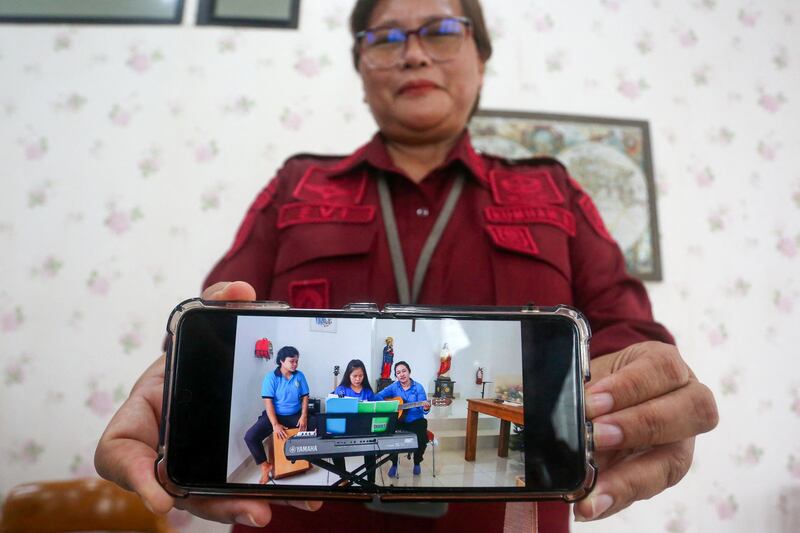Jakarta and Manila said they had signed an agreement to repatriate before Christmas Mary Jane Veloso, a Filipina drug-trafficking convict who has been on death row in Indonesia for the past 14 years.
Indonesia and the Philippines had agreed last month that Veloso would be repatriated and transferred to the custody of Filipino officials, but no date was set then for her return.
Yusril Ihza Mahendra, Indonesia's coordinating minister for law, human rights, immigration and corrections, said Friday that he expected Veloso to return to the Philippines before Dec. 25, making clear she was not being acquitted or absolved of her drug conviction.
“Indonesia is not granting clemency or a pardon, but we have agreed to send her back to the Philippines,” Yusril told reporters after signing the deal in Jakarta with Raul Vasquez, the visiting Philippine deputy justice secretary.
“The responsibility for her rehabilitation will now rest with the Philippine government.”
A pardon refers to the complete forgiveness of a crime, while clemency is an umbrella term that includes pardon, reduction of sentence, and delay in beginning a sentence or its suspension.
Future decisions on Veloso’s legal status, including any clemency and pardon, would be under the Philippines’ jurisdiction, the Indonesian minister added.
Vasquez said that Veloso’s return would allow her to serve her sentence in the Philippines under domestic laws. There is no death penalty in the Philippines.

Now 39 years old, Veloso was sentenced to death in 2010 after Indonesian authorities arrested her at Yogyakarta’s Adi Sutjipto Airport with more than 2.5 kilograms (5.51 pounds) of heroin in her suitcase.
The housewife and mother of two had traveled to Indonesia in April 2010 to find a job as a domestic worker.
Veloso was scheduled to be executed along with several other death-row convicts in 2015, but her execution was postponed at the last minute after Manila requested that her case be reviewed.
Veloso has consistently maintained she was a victim of human trafficking, duped into carrying the drugs by a syndicate that exploited her desperation as a migrant worker.
RELATED STORIES
[ Bittersweet homecoming awaits Filipina saved from Indonesian death rowOpens in new window ]
[ Mary Jane Veloso, a Filipina on death row in Indonesia, is coming homeOpens in new window ]
[ Marcos urges Jokowi to grant clemency to Filipina on Indonesia’s death rowOpens in new window ]
The Philippines, a country heavily reliant on remittances from its overseas workers, has campaigned for years to secure Veloso’s release.
Philippine official Vasquez described the agreement with Indonesia as a “Christmas gift” for Veloso’s family.
“This is a moment they’ve been yearning for – to hold Mary Jane in their arms again,” he said.
“It also strengthens our case against the traffickers who exploited her, ensuring they face the full consequences of their actions.”
Foreigners on death row
Indonesia’s decision to repatriate Veloso represents a notable shift in its approach to drug-related cases involving foreign nationals.
Indonesia’s strict anti-drug laws have been criticized for years by human rights organizations and some foreign governments, particularly for the use of the death penalty.
Former Indonesian President Joko “Jokowi” Widodo declared a “drug emergency” in February 2015 a few months after being sworn in for his first term.
During his two terms, he oversaw the executions of 18 drug convicts by firing squad, including two members of the "Bali Nine," a group of nine Australians convicted in 2005 for attempting to smuggle heroin out of Indonesia.
These executions were carried out despite international criticism and appeals for clemency.

Under current President Prabowo Subianto, who took office on Oct. 20, the government appears open to reevaluating high-profile cases.
Prabowo has approved a plan to repatriate the remaining members of the Bali Nine for humanitarian reasons, though the date for their return has not yet been announced.
Five of the Bali Nine members are serving life sentences. One died of cancer in June 2018, while another had her sentence commuted in November of that year.
Australia’s national broadcaster ABC reported that Prime Minister Anthony Albanese had lobbied Prabowo for them to serve the rest of their sentences in Australian prison when the two leaders met at the recent Asia-Pacific Economic Cooperation (APEC) summit in Peru.
Earlier this week, law minister Yusril said that Indonesia was set to begin discussions with the French government on the possible repatriation of Serge Atlaoui, a French citizen on death row for drug trafficking.
Yusril said that Indonesia had received a formal request from France’s Ministry of Justice seeking Atlaoui’s transfer.
Detailed discussions regarding the request are expected to take place next week, Yusril said.
Like Filipina Veloso, Atlaoui avoided execution in 2015 after he filed a last-minute appeal.
